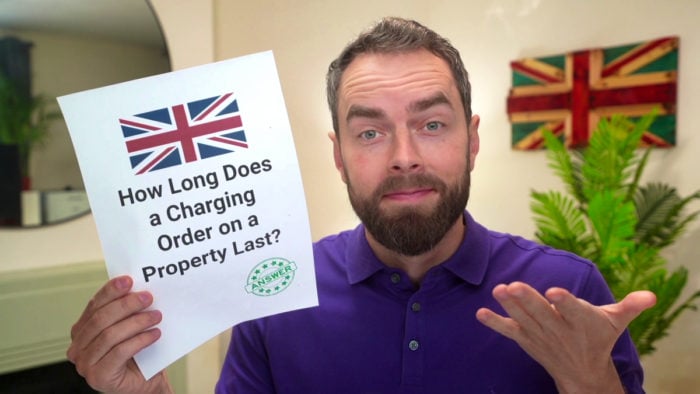How Long Does a Charging Order on a Property Last?
For free & impartial money advice you can visit MoneyHelper. We work with The Debt Advice Service who provide information about your options. This isn’t a full fact-find, some debt solutions may not be suitable in all circumstances, ongoing fees might apply & your credit rating may be affected.

For free & impartial money advice you can visit MoneyHelper. We work with The Debt Advice Service who provide information about your options. This isn’t a full fact-find, some debt solutions may not be suitable in all circumstances, ongoing fees might apply & your credit rating may be affected.
Are you worried about a charging order on your property? You’re not alone. Over 170,000 people visit our website each month for advice on debt issues.
In this article, we’ll cover:
- What a charging order is and how it works.
- The process of getting a charging order.
- How to handle a charging order if you own your property with someone else.
- Whether it is possible to sell a property with a charging order on it.
- Ways you might be able to write off some of your debt.
We understand how troubling it can be when a charging order is attached to your property. We’re here to help guide you through the process. Our team has plenty of experience dealing with these situations.
In England and Wales, a charging order doesn’t go away until the debt is paid off. But, in Scotland, the order will expire after 12 years. We’ll explain this in more detail later in the article.
Remember, you’re not alone in this. We’re here to help you understand what happens next with your charging order. Let’s dive in and find the answers together.
Is there a time limit?
There is a charging order limitation period in Scotland. As such, the time limit for a Charging Order to expire is 12 years in Scotland.
Because Charging Orders don’t expire in England and Wales, there is no charging order time limit. They will remain active until the creditor has been fully repaid, including any statutory interest owed.
Does it expire?
In England and Wales, Charging Orders do not expire. A Charging Order will remain active until the debt has been repaid in full.
Once the debt has been repaid, you can apply to the Land Registry to have the Charging Order removed. As I see it, repaying the Charging Order debt is the best way to get the matter settled.
In Scotland, Charging Orders expire after 12 years.
» TAKE ACTION NOW: Fill out the short debt form
The process of getting one
Before a claimant can apply for a Charging Order on their debtor’s property, the debtor must have already been issued a County Court Judgment (CCJ) or equivalent order, instructing them to pay the debt.
The claimant can then ask the court to enforce the debt. Often the claimant will enforce the debt using bailiffs, but if the debtor owns their own property, they might ask the court to issue a Charging Order as an alternative debt enforcement method.
A Charging Order can be requested straight away if the initial court order was issued after October 1st 2012. If the initial court order was issued before this date, the creditor can only ask for a Charging Order if the debtor has missed repayments.
How a debt solution could help
Some debt solutions can:
- Stop nasty calls from creditors
- Freeze interest and charges
- Reduce your monthly payments
A few debt solutions can even result in writing off some of your debt.
Here’s an example:
Situation
| Monthly income | £2,504 |
| Monthly expenses | £2,345 |
| Total debt | £32,049 |
Monthly debt repayments
| Before | £587 |
| After | £158 |
£429 reduction in monthly payments
If you want to learn what debt solutions are available to you, click the button below to get started.
In either situation, the claimant must first get an Interim Order, which is a court order that stops the debtor from selling the property while the court assesses the request for the Charging Order.
If the court allows the Charging Order, the Interim Order will change to what is known as a Final Charging Order.
Interim orders are requested without a court hearing, and are usually granted within 21 days. After which, the debtor will have 28 days to object to a Final Charging Order being issued.
If the debtor objects, there will be a court hearing, and they must attend.
Can you sell a property with an order?
You’re allowed to sell a property that is subject to a Charging Order if you wish. But the debt will have to be cleared using some (or all) of the funds raised from the property sale.
Interest on the debt may also be taken from the sale proceeds.
Thousands have already tackled their debt
Every day our partners, The Debt Advice Service, help people find out whether they can lower their repayments and finally tackle or write off some of their debt.

Natasha
I’d recommend this firm to anyone struggling with debt – my mind has been put to rest, all is getting sorted.
Reviews shown are for The Debt Advice Service.
What can you do afterward?
After a Final Charging Order is granted, you can either:
- Accept the order and look to pay off the debt.
- Ask for the Charging Order to be “set aside.”
- Ask for the Charging Order to be subject to conditions.
Getting a Charging Order set aside (cancelled) is extremely difficult and can typically only be done if the courts have made errors.
You have a better chance of getting conditions attached to the Charging Order, such as the inability to get an Order for Sale while your children are still in school.


